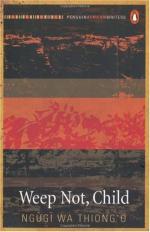|
This section contains 746 words (approx. 2 pages at 400 words per page) |

|
Weep Not, Child Summary & Study Guide Description
Weep Not, Child Summary & Study Guide includes comprehensive information and analysis to help you understand the book. This study guide contains the following sections:
This detailed literature summary also contains Quotes and a Free Quiz on Weep Not, Child by Ngũgĩ wa Thiong'o.
Weep Not, Child is the story of a boy, Njoroge, growing up through the years of the Kenyan Emergency. In this time, the Mau Mau fighters commit many acts of violence against the white settlers and Africans that they view as traitors, and the white authorities return this violence in kind. This novel explores the ways that this conflict affects all of those concerned.
The story starts with Njoroge being told that he will attend school; the first in his family to do so. This is Njoroge’s greatest wish, and education is a passion he pursues fervently throughout the novel. His brother, Kamau, has been apprenticed as a carpenter and will not go to school. Boro and Mwangi, their older brothers, had gone to fight in World War II. Mwangi was killed and Boro had returned home a changed man. Their other brother, Kori, works in the nearby town of Kipanga, and often brings home stories and friends in the evenings.
Central to the family is their father, Ngotho, who works on the land of a local English settler, Mr. Howlands. One evening, Ngotho is talked into telling a story and speaks about the legend of Gikuyu and Mumbi, to whom Murungu (the Creator) had given the land in the surrounding area. This land had been taken by the white settlers and, discovering that his father’s generation had been awaiting the fulfillment of a prophecy for its return, Boro leaves in anger. Njoroge hears his father’s words about the prophecy too, and thinks that with his education perhaps he is destined to make a difference.
As Njoroge’s education progresses, so too does the unrest amongst the African people of the area. A national strike in organized, and Boro is one of the speakers at a meeting on the first day. Despite being threatened with dismissal, Ngotho takes part in the strike and attends the meeting, where he leads the crowd to attack Jacobo, a wealthy black farmer who has been brought in to try to pacify the workers. Not only does Ngotho lose his job, but he is also evicted from his home, which is on Jacobo’s property.
Two and a half years pass, in the time between Parts 1 and 2 of the novel. In that time, the violence and danger in Kenya have increased. Jomo Kenyatta has also been arrested. When he loses his court case, there is a feeling that much hope has been lost, as Jacobo and Mr. Howlands, both of whom have grudges against Ngotho, have risen in power, and Njoroge’s brothers have become increasingly involved in political events and the Mau Mau Uprising.
As the country becomes more dangerous, and people Njoroge knows are arrested or killed, he buries himself deeper in his studies and his religion, viewing himself as like a prophet who, if he could just get an education, could save the country. He is successful in gaining entrance to secondary school, where he finds a community of students and teachers from all walks of life, working and studying together successfully. His school is like a haven from the death and destruction taking place in the rest of the country.
Meanwhile, Boro has become a Freedom Fighter and plotted to kill Jacobo. He has sent threats, and eventually must carry them out. When Jacobo is killed, Kamau is arrested for the murder, and Ngotho confesses to try to save his son. Njoroge is expelled from school and tortured by Mr. Howlands to try to gain information about the killing, of which he has no knowledge. The extent of the violence in Ngotho’s interrogation has left him near death, and Boro returns home only in time to be present for his father’s passing. The grief he experiences leads him to confess to Mr. Howlands that he killed Jacobo, before shooting Mr. Howlands as well.
With his family in pieces, his dreams of education gone, and his faith in God shattered, Njoroge tries to turn to his childhood friend, Mwihaki – the daughter of Jacobo with whom he has fallen in love. Although she loves him too, she cannot turn away from her duty to her family and her country, as Njoroge asks. Having now lost everything, Njoroge goes out and sits under a tree, waiting for dark when he intends to hang himself. Before that can happen though, Njoroge’s mother comes in search of him, and brings him home.
Read more from the Study Guide
|
This section contains 746 words (approx. 2 pages at 400 words per page) |

|



